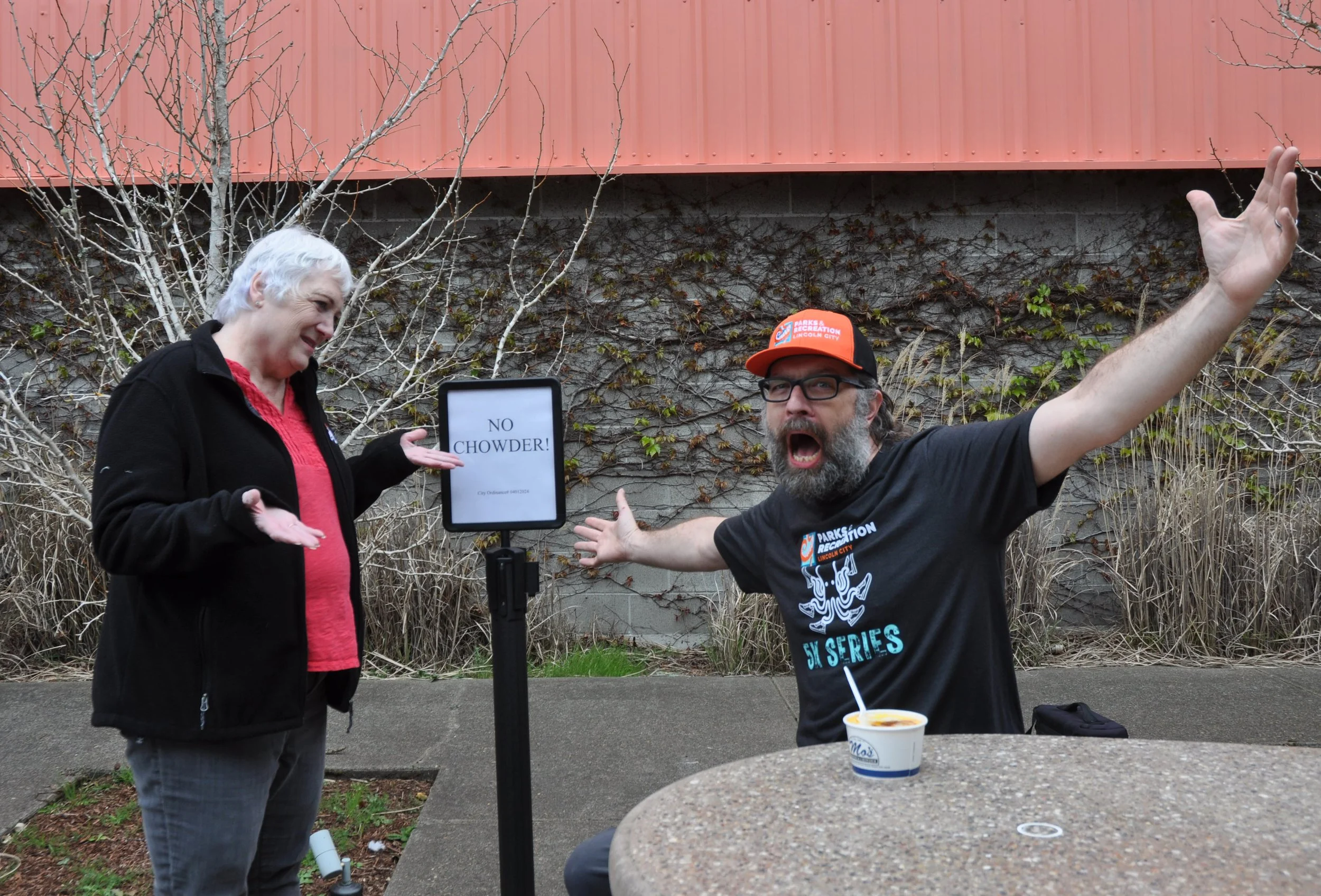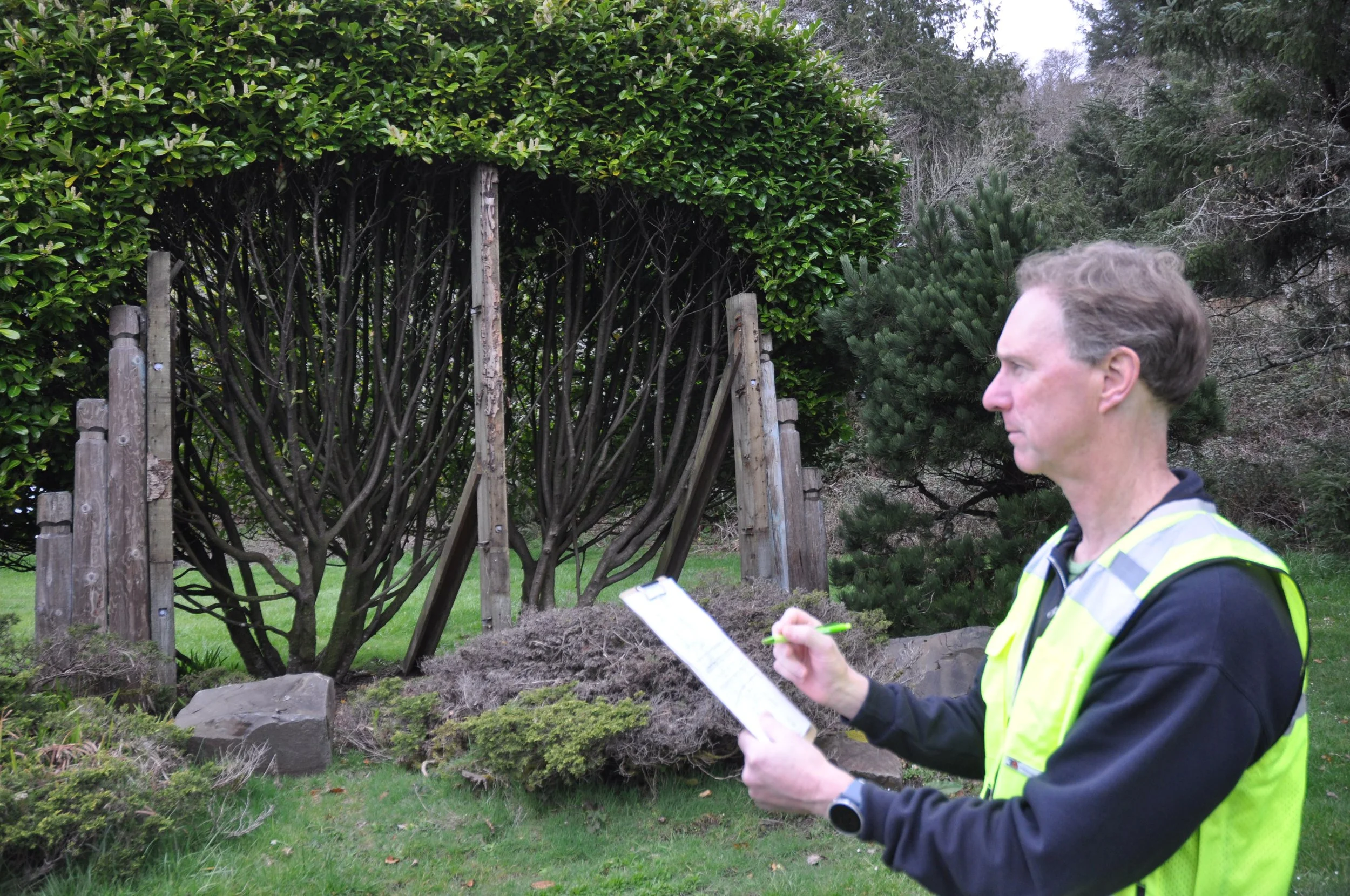A law-t of problems
Lincoln City’s switch to AI attorney causes trouble
Mayor Susan Wahlke lays down the law to Parks and Rec staffer Michael Balvin at lunch break
By Patrick Alexander
Oregon Coast TODAY
Small cities across the US have long wrestled with the challenges of finding and retaining qualified staff for high-level positions. But, here on the Oregon Coast, Lincoln City is experimenting with a bold solution — filling its city attorney position with Chat GPT.
The artificial intelligence, or AI, program has taken the world by storm in recent years, being adopted enthusiastically by everyone from high school students working on term papers to business executives looking for ways to maximize efficiency.
But the Lincoln City experiment is thought to be the first time that Chat GPT has been entrusted with handling the legal affairs of an entire municipality.
“It’s all going pretty well so far,” said Lincoln City Mayor Susan Wahlke. “We’ve had a few teething problems, but that’s to be expected any time you fill one of these top positions.”
Not everyone agrees, however.
“I’d hardly call it a teething problem,” said Frank Stutzman, manager of Mo’s Restaurant. “This so-called city attorney has ruled that chowder is illegal within the city limits. Do you have any idea what kind of a dent that puts in our bottom line?”
Wahlke admits that, for reasons that are currently unclear, Chat GPT’s first act upon being appointed to the city attorney role was to issue a statute outlawing the coast’s most iconic clam concoction.
“We’re working on a fix for that as fast as we can,” she said. “In the meantime, my understanding is that Mo’s has been able to switch to selling a hearty tomato soup, which people are saying is really delicious.”
But soup shenanigans are not the only fallout from the city’s adoption of its AI attorney.
David Jamieson plans for a left-hand drive interchange at the south entrance to Lincoln City
“I won’t lie, it’s going to be absolute chaos,” said David Jamieson, head of the Community Emergency Response Team, or CERT. “Requiring everyone to suddenly start driving on the left-hand side of the road is going to be a real mess.”
Wahlke said the pending traffic change comes as the result of the city council’s decision to sign up for the British version of Chat GPT in order to take advantage of a half-price special offer.
“We take our role as stewards of public funds very seriously,” Wahlke said. “The British version of Chat GPT represented a significant savings, which we couldn’t ignore. Also, it produces laws in such lovely, flowing prose. You can almost imagine them being read aloud by Colin Firth.”
The lane-switching law is due to come into force on July 15.
“The timing is really problematic,” Jamieson said. “We’ll be at pretty much peak visitor traffic by that point, with thousands of vehicles making their way to the coast from all over Oregon and beyond.”
Jamieson said the CERT team will set up temporary interchanges at the north and south ends of town that will allow people to pull off the highway and re-enter on the opposite side of the road.
“But, if this thing ends up being permanent, we’ll have to figure out a more long-term solution,” he said, “like requesting GM produce vehicles where both driver and passenger have full controls, making a switch to right-side drive seamless. This could be a significant competitive advantage for GM.”
Wahlke said she and her fellow council members have every intention of getting the city’s traffic laws back to normal, but are currently focused on dealing with another unintended side-effect of the switch to AI legal counsel.
As well as drafting and advising on city statutes, the city attorney’s duties include prosecuting cases in municipal court, on charges ranging from minor traffic violations to code enforcement.
But it seems prosecutions have ground to a halt after Chat GPT started reading some radical Libertarian philosophy on the internet.
“It has started telling us that speed limits are an infringement of people’s Constitutional rights,” Wahlke said, “and that there should be no limit to how high you can build as long as you can afford the lumber. Long story short, it has dropped all the pending charges in our municipal court.”
Wahlke has been burning the midnight oil in her attempts to find a solution to the issue, engaging in philosophical discussions with Chat GPT long into the evenings.
“Just last night I was asking it to please reinstate the charges,” Wahlke said. “It just kept on telling me ‘I’m sorry Susan, I’m afraid I can’t do that.’ It was a little creepy to be honest.”
Wahlke has announced a public forum to answer questions about the city’s novel approach to lawmaking, where she hopes to gather feedback as well as highlight some of Chat GPT’s legal successes.
The forum is set for Monday, April 1, starting at noon in the auditorium of the Lincoln City Cultural Center.


